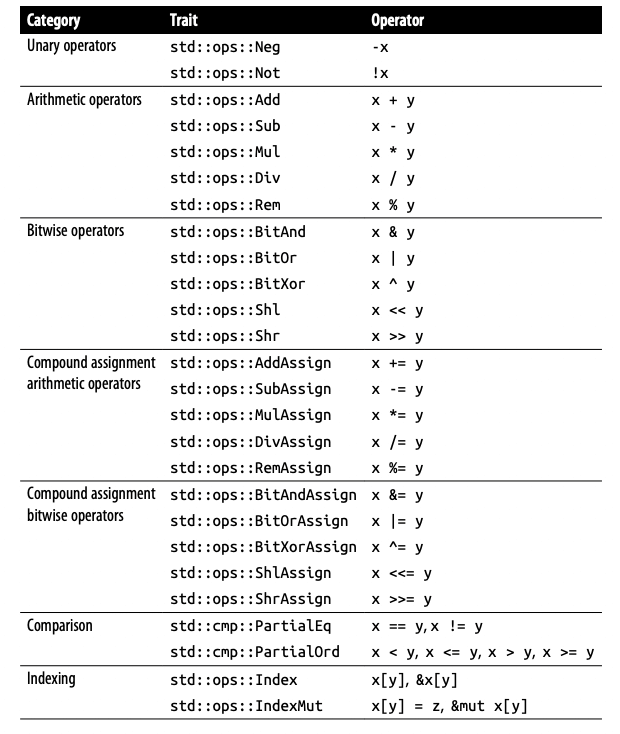【Rust】运算符重载
我们可以为自定义的类型实现加减乘除操作,只要实现标准库的一些 Trait,这称之为运算符重载。下图是可以重载的运算符和需要对应实现的 Trait 列表:

算数和位运算符
在 Rust 中,表达式 a + b 实际上是 a.add(b) 的简写,调用 std::ops::Add 的方法,Rust 标准库数值类型都实现了这个 Trait。所有如果我们要实现类型之间的算数运算,只需要为这个类型实现相应的 Trait 即可。
假设我们需要为 num 中的 Complex<T> 实现 + 运算符:
1 | pub struct Complex<T> { |
我们之前说过可以为一类类型添加方法,这样的话不至于为 Complex<i32> 和 Complex<u64> 都添加 + 运算符:
1 |
|
虽然 Rust 不赞成支持混合类型的操作,但我们可以实现,这里要求 L 必须能和 R 实现加法操作:
1 | impl<L, R> Add<Complex<R>> for Complex<L> |
一元操作符
Rust 有两个一元操作符 - 和 !,Rust 的所有带符号数字类型都实现了 std::ops::Neg,用于一元负数运算符 -。整数类型和 bool 实现 std::ops::Not,用于一元补码运算符 !。 ! 可以用于 bool 值也可以用于整数的按位取反。
std::ops::Neg 和 std::ops::Not 的定义如下:
1 | trait Neg { |
我们来实现对复数 Complex<T> 的 - 运算:
1 | use std::ops::Neg; |
二元运算符
所有 Rust 的数值类型都实现了算数运算符,整数和 bool 类型实现了位运算符。所有这些 Trait 都有相同的形式,^ 运算符对应的 std::ops::BitXor 如下图所示:
1 | pub trait BitXor<Rhs = Self> { |
复合赋值运算符
复合赋值表达式类似于 x += y 或 x &= y:它接受两个操作数,对它们执行一些操作,如加法或按位与,并将结果存储回左操作数。在 Rust 中,复合赋值表达式的值始终是 (),而不是存储的值。
许多语言都有这样的运算符,通常将它们定义为 x = x + y 或 x = x & y 等表达式的简写,但是 Rust 没有采用这种方法。相反,x += y 是方法调用 x.add_assign(y) 的简写,其中 add_assign 是 std::ops::AddAssign 的唯一方法:
1 | pub trait AddAssign<Rhs = Self> { |
Rust 的所有数字类型都实现了算术复合赋值运算符,Rust 的整数类型和 bool 实现了按位复合赋值运算符。我们来看一个对 Complex<T> 的假发复合赋值运算符:
1 | use std::ops::AddAssign; |
复合赋值运算符的内置Trait完全不同于相应二元运算符的内置Trait。实现 std::ops::Add 不会自动实现 std::ops::AddAssign。如果你想让 Rust 允许你的类型作为 += 运算符的左操作数,你必须自己实现 AddAssign。
相等比较
Rust 的相等运算符 == 和 != 是调用 std::cmp::PartialEq 的 eq 和 ne 方法,这个 trait 的定义如下:
1 | trait PartialEq<Rhs = Self> |
因为 ne 有个默认实现,我们只需要实现 eq 方法,这里有个为 Complex<T> 的实现:
1 | impl<T: PartialEq> PartialEq for Complex<T> { |
PartialEq 的实现几乎总是如出一辙,每次都显示写出来显得很无聊,所以 Rust 经常会为我们自动派生这个 Trait 的实现:
1 |
|
Rust 自动生成的实现本质上与我们的手写代码相同,依次比较类型的每个字段或元素,Rust 也可以为枚举类型派生 PartialEq 实现。自然地,该类型持有的每个值(或者在枚举的情况下可能持有)必须自己实现 PartialEq。
这里我们需要着重注意的是,这与算数运算符不同,eq 获取的是值的引用,这意味着比较 String,Vec 或者 HashMap 不会转移所有权:
1 | let s = "d\x6fv\x65t\x61i\x6c".to_string(); |
我们再来看看 Rhs: ?Sized 的约定,之前从未见过。这放宽了 Rust 通常要求类型参数必须是 Sized 类型的要求,让我们可以编写像 PartialEq<str> 或 PartialEq<[T]> 这样的 Trait。eq 和 ne 方法采用 &Rhs 类型的参数,将某些东西与 &str 或 &[T] 进行比较是完全合理的。由于 str 实现了 PartialEq<str>,以下断言是等价的:
1 | assert!("ungula" != "ungulate"); |
在这里,Self 和 Rhs 都将是 unsized 类型 str,使得 ne 的 Self 和 rhs 参数都是 &str 值。为什么 PartialEq? 叫做部分相等,因为从数学定义上来说,等价关系应该满足三个要求,对于任何值 x 和 y:
-
如果
x == y那么y == x; -
如果
x == y,y == x那么x == z; -
x == x永远成立;
虽然最后一个足够简单,但最后一个正是出问题的地方。Rust 的 f32 和 f64 是 IEEE 标准浮点值,像 0.0 / 0.0 以及其他没有适当值的表达式必须产生 NaN,而且 NaN 不等于任何值包括自身:
1 | assert!(f64::is_nan(0.0 / 0.0)); |
因此,虽然 Rust 的 == 运算符满足等价关系的前两个要求,但在 IEEE 浮点值上使用时显然不满足第三个要求,这称为部分等价关系。
如果你希望通用代码需要完全等价关系,则可以改为使用 std::cmp::Eq 作为边界,它表示完全等价关系:如果类型实现 Eq,则 x == x 对于该类型的每个值 x 都必须为真。在实践中,几乎所有实现 PartialEq 的类型也应该实现 Eq; f32 和 f64 是标准库中唯一属于 PartialEq 但不是 Eq 的类型。
标准库定义 Eq 是 PartialEq 的扩展,但是没有添加方法:
1 | trait Eq: PartialEq<Self> {} |
如果你的类型实现了 PartialEq 也希望是 Eq,那么必须显示实现 Eq,即使不用实现任何新的函数:
1 | impl<T: Eq> Eq for Complex<T> {} |
更简单的是我们可以使用派生 Eq 来实现:
1 |
|
泛型类型的派生实现可能取决于类型参数,使用派生属性,Complex<i32> 将实现 Eq,因为 i32 可以,但是Complex<f32> 只会实现 PartialEq,因为 f32 没有实现 Eq。当自己实现 std::cmp::PartialEq 时,Rust 无法检查你的 eq 和 ne 是完全相等还是部分相等。
有序比较
Rust 在 PartialOrd 中定义了 < > <= >= 的逻辑:
1 | pub trait PartialOrd<Rhs = Self>: PartialEq<Rhs> |
这个 Trait 中唯一需要实现的是 partial_cmp 方法,根据它的返回结果,就确定了比较结果:
1 | enum Ordering { |
但是如果 partial_cmp 返回 None,这意味着 self 和 other 相对于彼此是无序的:既不大于另一个,也不相等,在 Rust 中,只有 NaN 之间的比较才会有这样的结果。
像其他二元运算符一样,比较左右两种类型的值,左值必须实现 PartialOrd<Right>。 像 x < y 或 x >= y 这样的表达式是下面一些方法的简写:

如果想始终确定两个值得大小关系,那么就需要使用更严格的 std::cmp::Ord:
1 | pub trait Ord: Eq + PartialOrd<Self> { |
这里的 cmp 方法总是返回 Odering,说明两个值总是有顺序的,几乎所有实现 PartialOrd 的类型也实现了 Ord,除了 f32 和 f64。
Index 和 IndexMut
索引运算符 [] 也是可以重载的,例如,a[i] 实际上是 *a.index(i),如果这个表达式赋值给可变引用那家么实际上调用的是 *a.index_mut(i),这俩方法分别代表的是std::ops::Index 和 std::ops::IndexMut,它们的实际定义如下:
1 | pub trait Index<Idx> |
可以使用单个 usize 来索引切片,引用单个元素,因为切片实现 Index<usize>。但也可以可以使用像 a[i..j] 这样的表达式来引用子切片,因为它们也实现了 Index<Range<usize>>,这个表达式是简写为了:
1 | *a.index(std::ops::Range { start: i, end: j }) |
std::collections::HashMap 和 std::collections::BTreeMap 都实现了 Index<&str>。
所以我们可以这样使用:
1 |
|
从定义可以看出 IndexMut 扩展了 Index 并且增加了 index_mut 方法。当索引表达式出现在必要的上下文中时,Rust 会自动选择 index_mut。例如,假设我们编写以下代码:
1 | let mut desserts = |
IndexMut 的一个限制是,根据设计,它必须返回对某个值的可变引用。这就是为什么你不能使用像 m["十"] = 10; 这样的表达式的原因。因为向 HashMap 中插入一个值:该表需要首先为“十”创建一个 entry,并使用一些默认值,然后返回一个可变引用,但并非所有类型都具有简单的默认值,而且这里创建一个默认值并且立马丢掉,然后使用新值覆盖。
实现一个二维数组示例,存储图片的像素:
1 |
|
其他运算符
并非所有的运算符都可以重载,例如,用于错误检测的 ?,逻辑运算符 && 和 ||,范围运算符 .. 和 ..=,借用运算符 & 和赋值运算符 = 不能被重载。
解引用运算符 * 和字段(方法)运算符 . 是可以通过 std::ops::Deref 和 std::ops::DerefMut 重载的。
Rust 不支持重载函数调用运算符 f(x),而是当你需要一个可调用的值时,用闭包来实现。